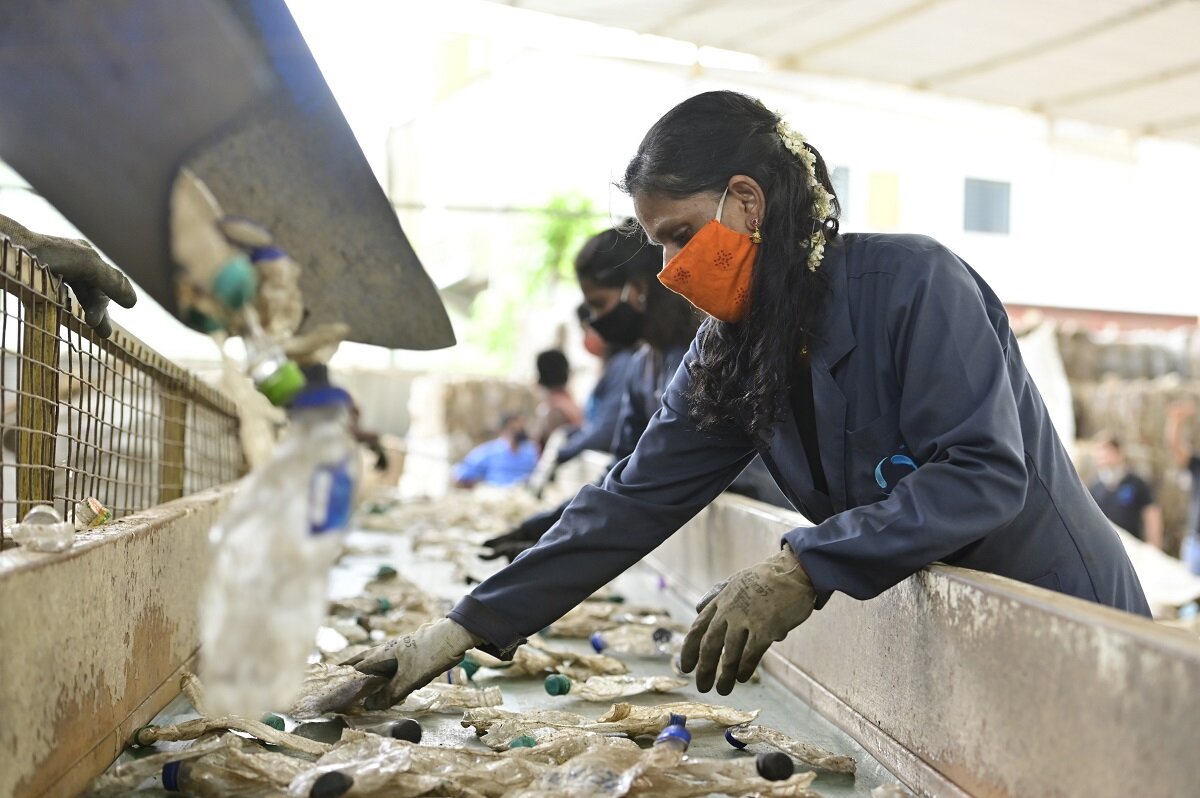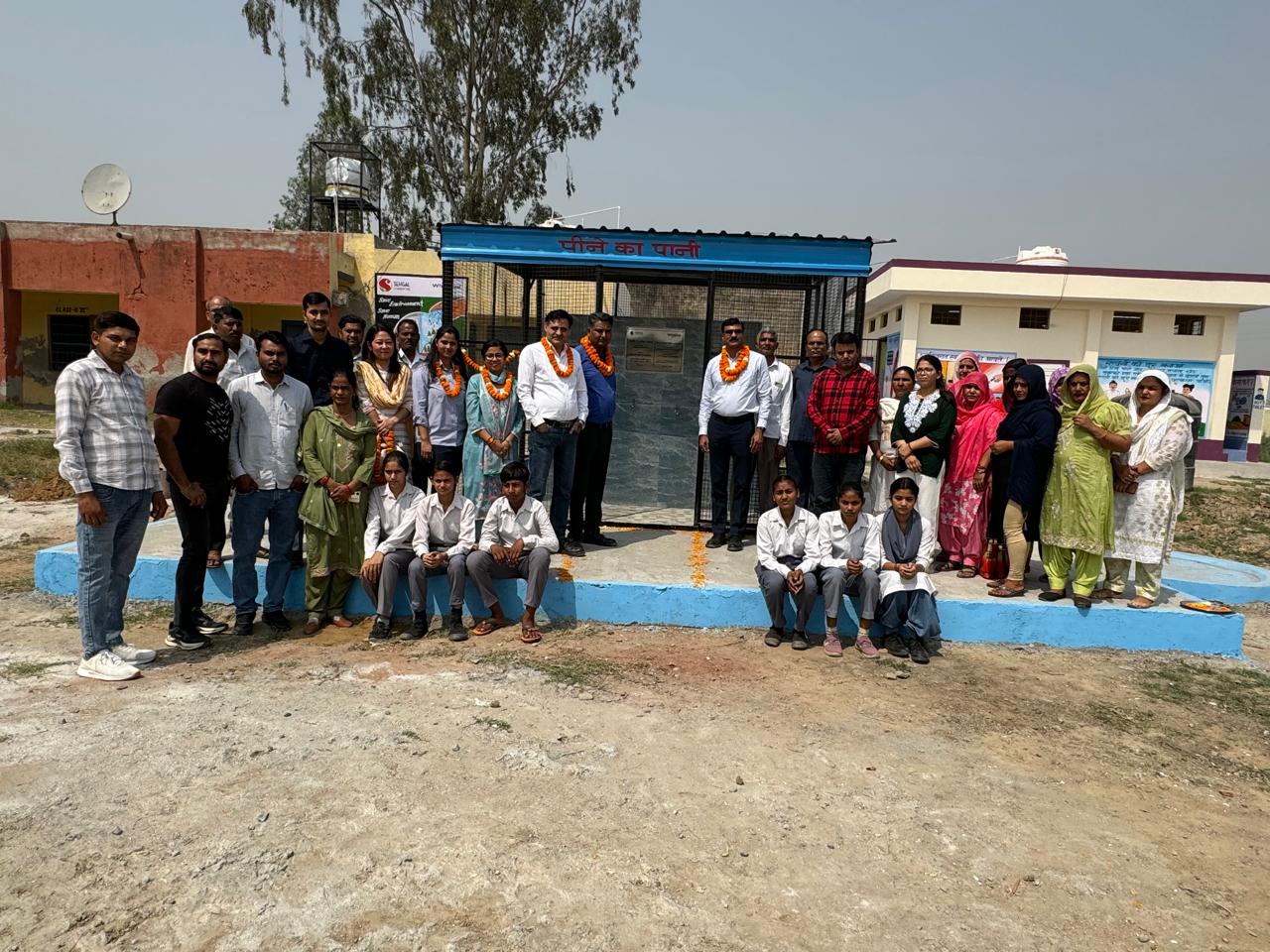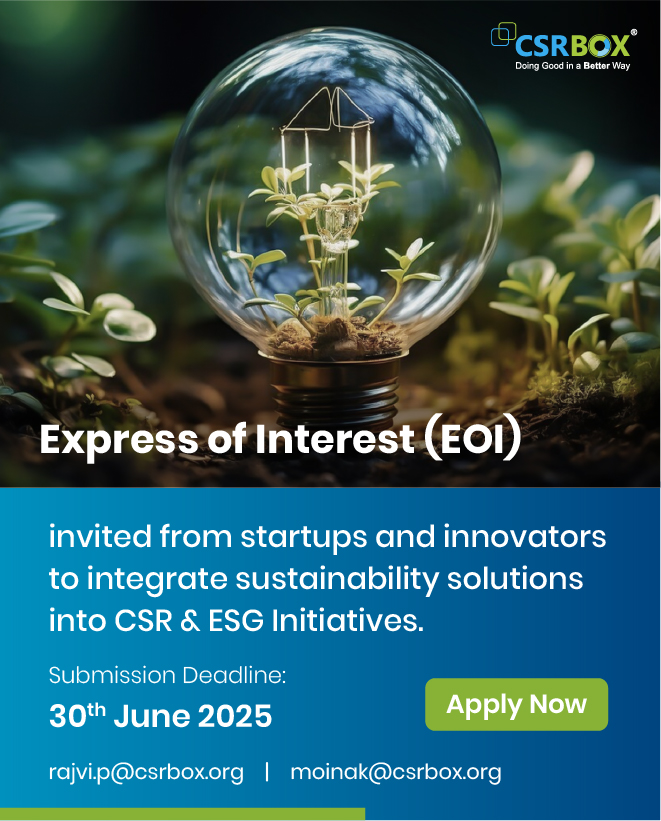10 NGOs Working in the Recycling Sector in India
By NGOBOX
February 8, 2023

Goonj Launched in 1999, Goonj has built a network of communities from urban to village India, channelizing material as a tool to address crucial gaps in rural infrastructure, water, environment, livelihood, education, health, disaster relief and rehabilitation. They aim to promote a circular economy by ensuring maximum use of each material. One of their recent initiatives Green by Goonj is a brand of recycled products. The organization says, “We ensure that nothing goes to waste – unwearable clothes, torn oversized jeans, old fabric, obsolete audio tapes, unused ties and anything else. Using these waste items, our team of women, from different parts of rural India, present a special edition of contemporary products, showcasing their aesthetics, craftsmanship and design sense.” Goonj's primary focus is on finding useful ways to transform the discard of urban houses into resources for villages. For example, it used 250 tons of discarded cloth to create traditional mattresses and quilts. Goonj uses material from urban schools as incentives to bring rural children to attend school, enhance their learning experience, and allow their parents to use their financial resources for other needs. The organization also works to raise awareness regarding menstrual hygiene, and fight against the idea that the topic is too private or dangerous to talk about or make public.
Source: Goonj website Greenobin Greenobin is a Gurgaon-based NGO that pioneers in providing a complete range of independent recycling and waste paper management facilities to both industrial and commercial customers as well as local authorities whilst reducing the volume of waste going to landfill. The organization says, “We aim to provide a customer-oriented service for the collection of paper scrap. We collect paper scrap from corporates, schools and housing societies. The service is designed to help businesses find technology and markets for waste paper that have been traditionally classified as "Scrap". Greenobin helps individuals, businesses, educational institutions, and government agencies save resources and money.” The overall objective of the platform is to help conserves resources, energy, and landfill space by helping individuals and businesses find alternatives to the disposal of unwanted materials or paper scrap. Parvaah Parvaah is a Delhi-based NGO run by students. The students undertake projects whose core objectives are to strengthen the underprivileged and economically backward rural people. This is done by providing them with daily needs through mobilizing community involvement of proactive volunteers. “This consistent and persistent implementation is aimed at bringing about unprecedented improvement in the lives of poor people. At Parvaah, we believe that it is the responsibility of each one of us to give back to the society that has nurtured and brought us up. Our mission is to fulfill this obligation by continuously working towards empowering and helping needy people, protecting the environment and other social causes, thereby contributing to the emergence of an evolving India.” Team Parvaah has written letters to airline/railway authorities, voicing concerns and requesting them to use non-plastic items. Further, the Parvaah team has also visited several Bhandaras held in front of temples and hospitals, asking the organizers to use non-plastic containers /plates for food distribution. The Parvaah team is optimistic about people reducing their plastic usage.
Source: Waste Warriors website Waste Warriors Tourism-related activities in the Indian Himalayan Region generate over 8.4 million MT of waste per annum. In 2012, Waste Warriors was launched in Dehradun to engage local communities and provide a sustainable solution for waste management in the eco-sensitive Indian Himalayan Region. The organization says that in rural areas, we work with multiple local, block, district & state-level officials. The organization says, “We design and initiate waste collection and storage systems called Waste Banks. We operationalize material recovery through local entrepreneurs and build capacities of the village and block-level officials. Further, we facilitate convergence between different government departments.” Plastics for Change India Foundation The first recycler to be certified by the World Fair Trade Organisation, Plastics for Change connects waste-pickers to global markets and helps brands switch to high-quality recycled plastic for packaging their goods. Their mobile app provides urban waste-pickers with access to fair market prices, and they are also slowly foraying into coastal communities to address the root cause of ocean plastic. Recently, they partnered with The Body Shop to help their supply chains transition to ethically sourced, recycled and fair-traded plastic. The organization says, “We have engaged over 450 people from rural communities who are grass-root scrap entrepreneurs and workers. Over 15,000 people have benefited from our initiatives.” Their initiatives to tackle and recycle waste include ‘Project Ghar’. This aims to build homes made out of low-value recycled plastic for informal waste collectors and their families in South India. They have also set up plastic collection kiosks on a beach in Mangalore. “The kiosk provides an avenue for both beach-goers and informal waste collectors to hand in their plastic waste.”
Source: Plastics For Change Paperman Foundation Chennai-based Paperman Foundation was started in 2010 to accelerate recycling in India. Our initiatives include public awareness programs, an on-demand recycling platform, managing processing units in partnership with various state governments, turnkey contractors for setting up recycling units, and other ancillary services for the industry. The organization says, “With more than 8 years of experience in the field, we have recycled and prevented 1 million kgs of waste from entering the landfills.” Paperman launched a mobile app offering on-demand doorstep recycling, which people could use to directly connect with local ragmen to sell their waste. Their Circular Economy Model not only helps people recycle but also pushes the money generated from it towards non-profits. Along with this, the organization’s initiatives also include public awareness programmes. BasicShit BasicShit, a Delhi-based NGO, is not waiting for the government to solve India's swelling plastic problem. A collective of architects, artists and scientists - the NGO's members follow an intersectional approach to plastic and sanitation and build sustainable urinals and toilets - often from plastic - for people living on the streets. From Trash to Toilet to Trash, they want to reduce the burden of waste on humans and the environment by creating waste management solutions. Our mission begins with major townships and agricultural fields. We will set up toilets at major public junctions, and also a single-use plastic recycling facility in India to create a more centralized system. The human waste we collect will be efficiently disposed of or converted to urea, based on the location.” To date, by recycling over 9000 kgs of waste, composed of plastic and household products, the organization has made a plethora of products, including chairs, ashtrays, urinals, toilets, birdhouses, doghouses, tables, spitting bowls and even laptop stands. Phool Uttar Pradesh-based Phool is solving the problem of flower and packaging waste. They have created compostable packaging using seed paper infused with Tulsi, or holy basil, seeds, and ink made from vegetable dyes. The organization says, “After using the incense or flowers, all the user must do is unfold the paper, bury it in a pot with dirt, water it regularly, and watch the seeds sprout into a Tulsi plant. A QR code on the pack sends users to a microsite, where they can share photos of their plant and get discounts on products.” Phool is dealing with flower waste by providing clean, safe jobs for manual workers. Because the flowers have been used for worship, they are seen as sacred and cannot be sent to a landfill. Phool works with local women to collect the flowers from the rivers and then upcycle them into compost and useful products such as incense sticks, soap, and vegan leather goods.
Source: Hand in Hand India Hand in Hand India Launched in 2002 at Kancheepuram, Tamil Nadu, Hand in Hand India’s initial focus was on bringing children out of the labor force and keeping them in school. Later they extended to include the family – addressing issues of community health, skills development and eventually, job creation. Today, they are a pan-Indian NGO rewriting the story of rural India by alleviating poverty and creating jobs. Further, they have also established their work across seven countries. In the sector of waste management, the organization realized that innumerable tonnes of solid waste are generated every year across India. A very small percentage of this is composted, while the rest is dumped in landfills. The organization says, “Our Solid Waste Management (SWM) Programme was established in 2007 to deal with the waste menace faced by communities. The SWM wing creates end-to-end solutions to manage waste generated by urban and rural areas. Our goal is to reduce the waste that is being used as landfills.” To date, 647,376 households have been covered and 16,132 kgs of organic manure have been produced every month. Saahas Zero Waste Saahas is a Bengaluru-based non-profit organization working in the field of waste management. Since 2001, they have been helping build communities across rural and urban India that manage their waste at source by reducing, reusing and recycling their waste and achieving 90% resource recovery. “At Saahas, we believe that when waste is managed at source, it becomes a resource. To date, we have diverted over 53,000 kilograms of waste from landfills every day. We specialize in handling bulk waste produced by MNCs, residential communities, universities, tech parks and other organizations, and carrying out end-to-end turnkey projects. Using sustainably managed and recycled waste, the firm creates clothing, stationery, bags and backpacks, and sells them on its website.
© Renalysis Consultants Pvt Ltd



.jpeg)
.jpg)
.jpg)
 (1).png)



